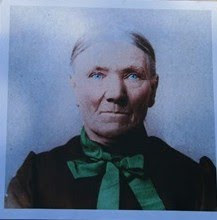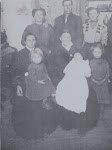 |
| Handcart Missionaries of 1856 |
COMPANY WHICH LEFT FLORENCE, IOWA, JUNE 5TH. ELDER PHILEMON C. MERRILL, CAPTAIN.
James Cooper, W. F. Fream, A. Maltha, E. Brunson wife and 2 children, George Russell; S. A. [Samuel A.] Woolley, L. H. Mausley [Louis Henry Mousley], F. Raymond, S. [Stephen] Golding, wife and 3 children, E. Steele, James Steele, H. M. Turner, wife and 2 children, A. J. Turner, J. W. Hammer, Jeter Clinton, B. P. Brown, Henry Eckells, wife and 2 children, Samuel Cursley and wife, Abraham Hayes, Charles Hammer, Frances Nash.
Elisha Edwards, David P. [Pinkney] Rainey and wife, Thomas Singleton, wife and 2 children, Archibald Kerr, wife and 2 children, McCaslin Frost and wife, Charles Singleton, William Maylett and wife, Samuel Rudd, Edward Rudd, Matthew Moore; William Sanders, wife and 3 children, George [Sloan] Bailey, wife and 3 children, William Smith, wife and 4 children, Joseph Clark, wife and 2 children, John [Henry] Craghead, wife and 5 children.
E. B. [Enoch Bartlett] Tripp, Phebe Weltan, Daniel Munns, wife and 3 children, John Simperley, wife and 4 children, Francis Miller, John Ashcroft, wife and 4 children, Samuel Philips [Phillips], Joseph Roe, Thomas H. [Huskinson] Giles, wife and 4 children, Thomas Rasband, wife and 2 children, William Giles, wife and 6 children, George Giles, wife and 1 child, Harriet Green, John Crook, George Spratley, James Haggard [Hoggard] , wife and 4 children, Ann Roe.
Francis A. [Almond] Brown, wife and 2 children, Augustus P. Canfield, Hannah H. Brown, Joel A. [Almon] Bascom, Lucina A. Burton, Henry I. Runnels, wife and 4 children, Colinan Toplin [Joplin] and wife, F. Woodard, Susannah [Pilling] Laycock and 3 children, George and Eliza S. [Sophia Brown] Rust, M. C. Kinsman, Nancy Kilbreath and 1 child, Catherine Brown and 2 children, William Black, Frederick Spat and wire, Lawrence Fry, Samuel Vowels.
Edwin Whiting, Samuel Crain, wife and 5 children, Gilbert Avery, wife and 4 children, [Thomas] Jefferson Dimick, wife and 6 children, William G. Palmer, wife and 3 children, Joseph and Henry Field, William Nowell and wife, James McCloud, Jesse [Askew] Tye, John Burlston.
HANDCART COMPANY, E. ELLSWORTH, CAPTAIN.
LEFT CAMP NEAR IOWA CITY, JUNE 9, 1856.
Edmund Ellsworth, Thomas Fowler, Thomas Passey, Eliza Robinson, Mary Ann Bates, Mary Ann Meadows, Andrew Galloway, wife and child, David Bowen, William Harmon, Edward Frost, wife and 2 children; Elizabeth Franklin, Eleanor Hill, Sarah Ann Sprig, James Shinnsen [Sheen], and 12 children; Ann [Perkins] Price and 2 children, Eleanor Vaughan, Mary Mays [Mayo], Alexander Stevenson, wife and 7 children, George Clark [Clarke], wife and 3 children; Thomas Ivins, John Powell, wife and 6 children; Daniel Jones, wife and 6 children; Mary Ann Baker and 5 children; John Lloyd, wife and 6 children; Wm. Green.
Arthur [Archer] Walters, wife and 5 children; John Devenoux [Devereaux], Thomas Richins, wife and child; Mary Ann Jones, Thos. [Thomas Bradford] Bourne, wife and 6 children; John Robinson, wife and 4 children; George Hanson, wife and child; James Birch, wife and 3 children; Absalam [Absalom] Frisby, Ann Ham, Hannah Baldwin, John Ash, Jr., wife and 2 children, Richard Preater [Preator], wife and 2 children; Hester [Esther] and Hannah Jones; Hannah [Chapman] Goodworth, and 4 persons; John Chapman, James Murray, Henry Moss, George Warding [Waring], George Williams, James Bowers, wife and 6 children.
Samuel Bond, wife and 2 children; Walter Sanders and 3 children; Eliza Jeffries, Richard Sheltar [Shelton], Joseph Argyle, wife and 6 children; William Pratt, wife and 4 children; William Morriss [Morris] and wife; James and Sabina Jones; Jas. [James] Bailey, wife and 5 children; C. H. Briggs [Charles H. Bridges], William Birch and wife; Elizabeth Walker, Abraham Hurst [Hunt] and wife; John Lee, wife and 6 children; Sarah and Joseph Ash; Jon Wellings [Job Welling], wife and child; John [Rowe] Moyle, wife and 5 children; John Bunney and wife; John Dunney [Doney] and wife; William Yeo, William Butler and wife; John Oakley, Robert Stodart [Stoddart], wife and 12 persons.
Elizabeth Taylor, Henry Walker and wife; John Kettle, wife and 6 children; Thomas Eldridge [Eldredge], wife and child; Joseph Rasdell and wife; Sarah Marshall and 6 children; Maria Good [Goode], John A. Phillips, George Nappriss [Neppress], John Lewis and child; Thomas and Benjamin Lloyd; John Henwood, Jane Lewis, Elizabeth Henwood, and 2 children; James [Constable] and Ann [Miller] Warner; Sarah T. [Sarah Jane] Miller, William Brough, Elizabeth and Emma Walker, James and Mary Commonder [Commander], Alice Brough.
HANDCART COMPANY, D. [DANIEL] D. McARTHUR, CAPTAIN.
LEFT IOWA CITY CAMP, JUNE 11, 1856.
Walter Grainger, wife and 5 children; William K. [Knox] Aitken and 2 children; Ellen Wandles; Ellen Wandles, jr.; Mary Mathierson [Mathieson]; Thomas Gallup [Gallop] and wife; James Reid, wife and 4 children; George Muir, wife and 2 children; John Frew, wife and 4 children; Alex. McDonald; Agnes Stewart and 3 children.
Hugh Clotworthy, wife and 4 children; Mary McGowan; Joseph McDougall [McDougal]; John McDonald; William Johnstone [Johnston]; wife and 4 children; John Bell, wife and 2 children; Elizabeth Shields; David Chambers, wife and son; A. M. [Anna M.] Randall and son; Elizabeth and Emma M. Burdett; William Hall; Samuel Hargraves, wife and 7 children; William Finlay [Findley], wife and child.
William Meikle, wife and 2 children; Mary Hay; Agnes [Adamson] Anderson, wife and 2 children; Richard Kennington, wife and 5 children; Mary Ann Bone; Robert Parker, wife and 4 children; Bedson Eardley and wife; Mary Bathgate and daughter; William Lawson; George Peacock; John Gray, wife and 4 children; James Crawford; Elizabeth [Cumming] Reed [Reid].
Elizabeth Twiddle [Tweddle]; Catherine Grainger; James Dechman [or Dickman]; John Dreany [or Dramey], wife and 2 children; Isabella Park; James Gardner, mother and 4 children; Neil P. [Peter] and Georgeina [Georgine Maria Keller] Ipson; Sarah Smart; Hannah Hodgetts; Peter and Elizabeth Richardson; George Johnstone [Johnston], wife and child; Janet Hardie, and 5 children; Andrew Smith; Anna Furer [Furrer]; Josephine Ludut [or Ludert] and child; Henry E. [Ebenezer] Bowring, wife and child.
William and Maria Wright; Rebecca [Wood] Sanderson and 2 children; William Hillhouse, wife and 8 children; Elizabeth Maxwell, and 5 children; Elizabeth Dorrech [Darragh]; Ellen Russell; Elizabeth Maxwell, Mary Gale; Patrick [Twiss] Birmingham, wife and 3 children; Thomas Lucas, wife and 3 children; William Lawrenson, wife and 2 children; Mary Baranigan [Brannigan]; Elizabeth Morehouse; William Heator [Heaton], wife and 2 children; John McClare [McCleve], wife and 7 children; Henrich Elliker, wife and 7 children; John Schies, and wife; Susannah Bruner; Ralph Ramsay, wife and child; Margaret Dowule [Downie].
DANIEL D. MC'ARTHUR, Captain.
TRUMAN LEONARD, SPICER W. CRANDALL, Counselors.
Source of Trail Excerpt:
"Emigrants for Utah," Deseret News [Weekly], 6 Aug. 1856, 176.
Available at the following institutions:
Church History Library, Salt Lake City, Utah
Family History Library, Salt Lake City, Utah
University of Utah, J. Willard Marriott Library, Salt Lake City, Utah
Utah State University, Merrill Library, Logan, Utah





















